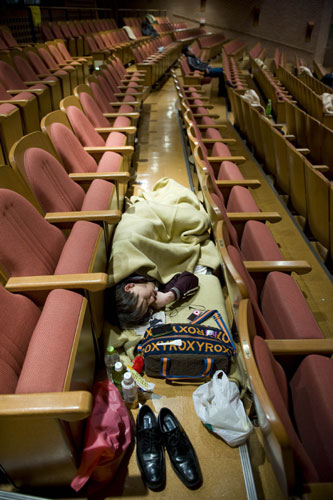Nuclear Meltdown
Millions of Japan survivors without water, power
By Jay Alabaster (China Daily)
Updated: 2011-03-14 08:24
 |
Large Medium Small |
|
 A survivor sleeps at a shelter on Sunday at Morioka, Iwate Prefecture in northern Japan. Lu Xiaowei / Xinhua |
TAGAJO, Japan - Millions of survivors were left without drinking water, electricity and proper food along the pulverized northeastern coast of Japan on Sunday.
At least 1.4 million households had gone without water since the quake struck and some 2.5 million households were without electricity. Temperatures were to dip near freezing overnight.
Trade Minister Banri Kaeda said the region was likely to face further blackouts and power would be rationed to ensure supplies go to essential needs.
Large areas of the countryside remained surrounded by water and unreachable. Fuel stations were closed and people were running out of gasoline for their vehicles.
Public broadcaster NHK said around 380,000 people have been evacuated to emergency shelters, many of them without power.
In Iwaki Town, residents were leaving due to concerns over dwindling food and fuel supplies. The town had no electricity and all stores were closed. Local police took in about 90 people and gave them blankets and rice balls but there was no sign of government or military aid trucks.
At a large refinery on the outskirts of the hard-hit port city of Sendai, 30-meter-high bright orange flames rose in the air, spitting out dark plumes of smoke.
The facility has been burning since Friday. A reporter who approached the area could hear the roaring fire from afar, and after a few minutes the gaseous stench began burning the eyes and throat.
At a small park near the refinery, trees and large swaths of grass were covered in thick black crude oil. Two large tanker trucks were jammed sideways among the trees, their gas tanks crumpled.
Mayumi Yagoshi, an office worker at the refinery, said she had taken the day off on Friday because she had slipped and hurt her back.
"I was lucky, but I feel really bad. My mobile phone doesn't work and I have no idea what happened to everyone else," she said.
In Tagajo, dazed residents roamed streets cluttered with smashed cars, broken homes and twisted metal.
Residents said the water surged in and quickly rose higher than the first floor of buildings. At Sengen General Hospital the staff worked feverishly to haul bedridden patients up the stairs one at a time. With the halls now dark, those that can leave have gone to the local community center.
One older neighborhood sits on low ground near a canal. The tsunami came in from the canal side and blasted through the frail wooden houses, coating the interiors with a thick layer of mud and spilling their contents out into the street on the other side.
"It's been two days, and all I've been given so far is a piece of bread and a rice ball," said Masashi Imai, 56.
Associated Press
(China Daily 03/14/2011 page12)
| 分享按钮 |



